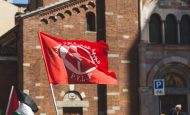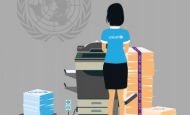The UN’s Top Priority for Palestine: $18 million for More NGO-linked anti-Israel Lawfare
The United Nations Development Assistance Framework and the Palestinian Authority have signed a “strategic programming framework” for 2018-2022, providing over $1 billion to “support[] Palestine’s path to independence” and other “pillars of the government’s National Policy Agenda.”
The 73-page document provides significant insight into the machinery (and machinations) of UN development programs and the politicization of development and humanitarian aid. These elements are worth further study.
Two disturbing aspects of this plan immediately stand out.
- According to “Strategic Priority 1: Supporting Palestine’s path to Independence,” and repeating the standard claims beginning with the infamous 2001 Durban NGO Forum declaration, “Human rights mechanisms are increasingly engaged to hold Israel accountable for its obligations under international law.” Building on this foundation “The UN will increase its support for Palestinian institutions (state and non-government)” (emphasis added), to help them “effectively access international accountability mechanisms in order to hold Israel accountable for its violations under international law” (pp. 15-16). This includes bolstering efforts for “Palestinian civil society representatives [to] submit[] written information to the human rights treaty bodies” and “actively monitor[], advocat[e] and mobiliz[e] on human rights violations” (pp. 39-40). (There is no parallel support for “monitoring, advocating and mobilizing” in response to Palestinian violations under the human rights treaties the Palestinian Authority has signed.)
- As with many UN initiatives, this strategy substantiates the longstanding collusion between UN agencies and radical anti-peace NGOs for political wafare – as documented extensively for years by NGO Monitor. Many of these NGOs promote antisemitism, rejectionism, and BDS.
The “strategic program” was created in consultation with NGOs such as Al-Haq, Al-Mezan, AIDA, Islamic Relief, Kvinna till Kvinna, Norwegian People’s Aid, Norwegian Refugee Council, Palestinian Center for Human Rights, Palestinian Medical Relief Society, Palestinian NGO Network, and Union of Health Work Committees (pg. 72). Some of these NGOs have connections to the PFLP and Hamas terror groups.
More importantly, the modus operandi of the UN agencies that will be receiving funds (over $18 million total, including $3.35m for UNICEF and $10.5m for UNDP – pg. 25) is to coordinate and reinforce the ongoing anti-Israel campaigns in conjunction with highly politicized NGOs. UN agencies and NGOs helped fashion a strategy that guarantees that these same NGOs and UN agencies will continue to receive massive amounts of money for their ongoing anti-Israel political warfare campaigns. As the past record shows, these campaigns will do nothing to revitalize the “stalled peace process” or the creation of a “peaceful and just Palestinian society.”


